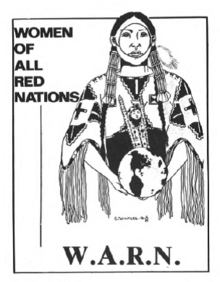User:Arse.Lupin/Women of All Red Nations
| This is the sandbox page where you will draft your initial Wikipedia contribution.
If you're starting a new article, you can develop it here until it's ready to go live. If you're working on improvements to an existing article, copy only one section at a time of the article to this sandbox to work on, and be sure to use an edit summary linking to the article you copied from. Do not copy over the entire article. You can find additional instructions here. Remember to save your work regularly using the "Publish page" button. (It just means 'save'; it will still be in the sandbox.) You can add bold formatting to your additions to differentiate them from existing content. |

Article Draft
[edit]Lead
[edit]Women of All Red Nations (WARN) was a Native American women's organization that fought for Native American women's rights. It was established in 1974 by Lorelei DeCora Means, Madonna Thunderhawk, Phyllis Young, Janet McCloud, Marie Sanchez and others. WARN included more than 300 women from 30 different tribal communities. Many of its members had previously been active in the American Indian Movement and were participants in the 1973 Wounded Knee incident. The inaugural conference took place in Rapid City, South Dakota.[1][2]
Article body
[edit]Rapid City Conference (1974)
[edit]Due to issues in AIM, Madonna Thunderhawk, Janet McCloud, and Lorelei DeCora called for a women's meeting. This conference was held in Rapid City, South Dakota. Over 300 women from different tribes attended to discuss concerns about women's rights within indigenous communities . Attendees were both former AIM activists and new activists. AIM had not attended to the concerns of these women, so the conference was held to come up with an alternate solution. This solution was WARN - Women of All Red Nations. WARN was founded by the women at the Rapid City conference to attend to issues involving indigenous women's health and safety. Other concerns that they had were ending domestic abuse, ending involuntary sterilization of Native women, and fighting substance abuse in tribal communities.[2][3]
At the conference, it was established that WARN would continue the movement for Indigenous Peoples' rights, however, they would ensure that women had a large role in the activism. Women were not allowed to be leaders in AIM. WARN decided to change that. Women were making the decisions. They were leading. Women's rights became a more prevalent issue and issues involving women were taken more seriously.[3][4]
Protests and Political Action
[edit]To protest the issues that WARN was advocating against, political action was taken and protests were held. In 1978, Janet McCloud led a march between numerous sites, located from the West Coast all the way to Washington D.C. [5]The march was 3,000 miles. At the end of the march, a protest was held in Washington D.C. The protest was opposing proposed new bills that would constrict Indigenous Peoples' treaty rights, as well as bills that would violate fishing, hunting, land, and water rights held by the Native population. Over 30,000 people rallied in the capital to oppose these bills. Soon after the rally, McCloud traveled to Seattle and destroyed copies of the bills in front of the Seattle representative's office. While many other protests and rallies happened around this time, this is the only one directly associated with WARN.[4][6]
References
- ^ Orleck, Annelise (2022). Rethinking American women's activism (Second edition ed.). New York. ISBN 978-1-000-60670-6. OCLC 1312651316.
{{cite book}}:|edition=has extra text (help)CS1 maint: location missing publisher (link) - ^ Smith, Andrea (2005-04-01). "Native American Feminism, Sovereignty, and Social Change". Feminist Studies. 31 (1): 116. doi:10.2307/20459010.
- ^ Resist. "Resist Newsletter, Feb. 1981: Resist Newsletters".
{{cite journal}}: Cite journal requires|journal=(help) - ^ Hightower-Langston, Donna (2003). "American Indian Women's Activism in the 1960s and 1970s". Hypatia. 18 (2): 114–132. doi:10.1353/hyp.2003.0021. ISSN 1527-2001.
- ^ Orleck, Annelise (2022). Rethinking American women's activism (Second edition ed.). New York. ISBN 978-1-000-60670-6. OCLC 1312651316.
{{cite book}}:|edition=has extra text (help)CS1 maint: location missing publisher (link) - ^ Thompson, Becky (2002). "Multiracial Feminism: Recasting the Chronology of Second Wave Feminism". Feminist Studies. 28 (2): 337–360. doi:10.2307/3178747. ISSN 0046-3663.
